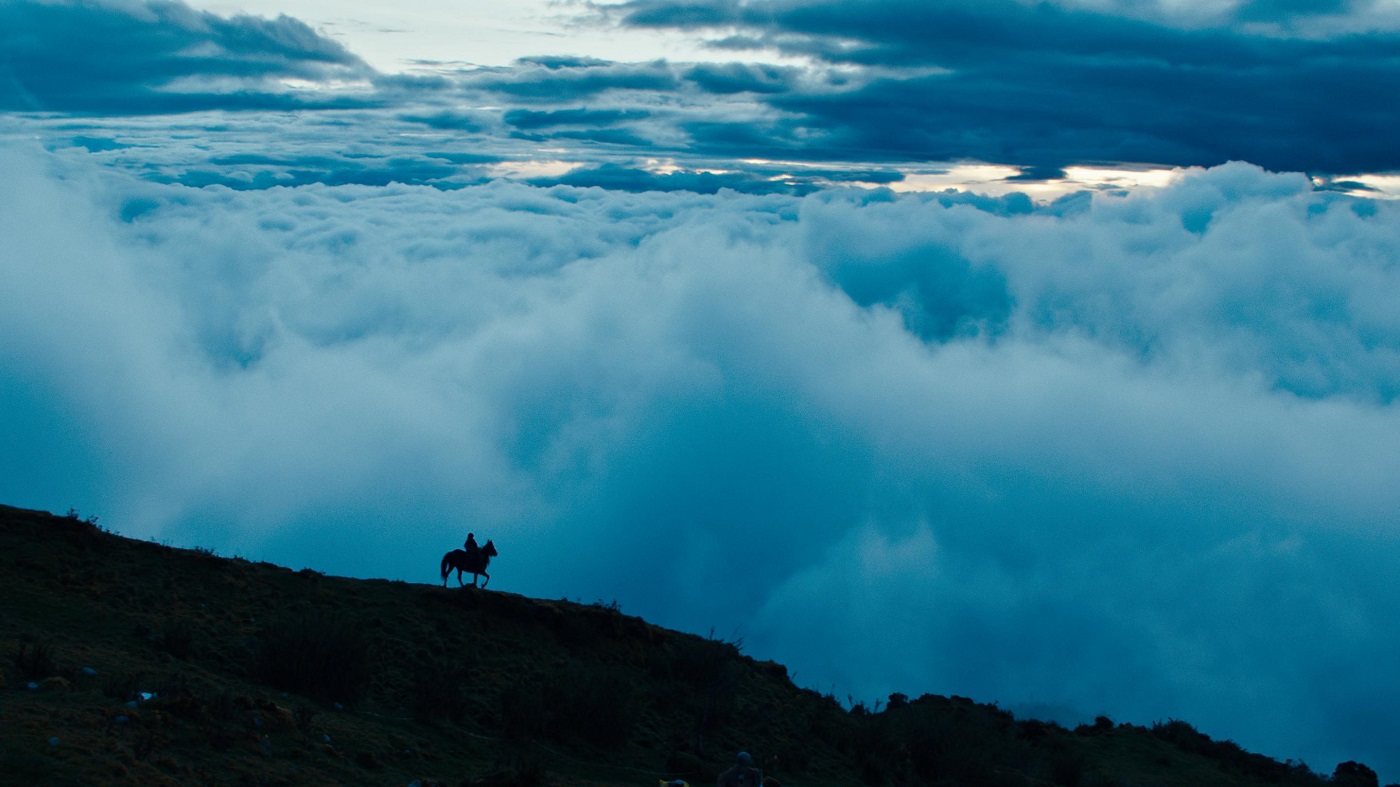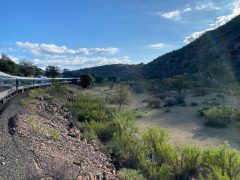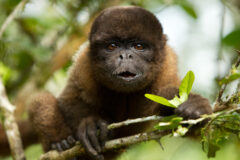Monos: A Feverish Journey into the World of Teenage Guerrilla Warfare
Annabel Kemp - Former Travel Expert
Jungle fever descends upon all those who enter this hypnotic world of child soldier guerrilla warfare. Monos is the critically-acclaimed second feature film from Colombian writer-director Alejandro Landes, set in the unforgiving, hauntingly beautiful wilderness of an unspecified Latin American country. High up on a mountaintop, a band of raggedy teens lead a semi-feral existence. They entertain themselves by fighting, inventing games, staging ‘marriages’ between young couples and taking every opportunity to gleefully fire their AK-47s into the air. The gang go by playful nicknames which reference pop culture (Rambo, Smurf, Boom Boom) as well as animals and mythical creatures (Wolf, Dog, Bigfoot). Initially the group seems ruled by a lawless abandon, lost in a world of swirling clouds and eerie, gargantuan stone sculptures. But the arrival of their military commander ‘The Messenger’ (played by former child soldier Wilson Salazar) brings their harsh reality into sharp focus. Rigorous, dizzying training ensues as orders are barked mercilessly, reminding the unit of their duties: look after a cow generously lent by the ‘Organisation’ they answer to, and guard the hostage. The latter is a journalist from the USA, played by a near-skeletal Julianne Nicholson. Her relationship to the kidnappers is complex and fluid; tender maternal concern, violent power struggles and furtive sexual exploration ripple uncomfortably through the plot.
This is a film which defies the viewer to relax. Fleeting moments of joy and peace whirl into sensual, psychedelic chaos (epitomised best by an explosive enemy attack on the Monos’ stronghold right after the teens have eaten a handful of shrooms). When a stray bullet triggers a chain of turbulent repercussions, the group must descend into lowland jungle and begin an anarchical game of survival. In many ways this feels like a mythical tale; children lost in an ancient forest, facing untold dangers on their journey to adulthood. Yet there is no tidy moral message to this fable; the young subjects are both victims and perpetrators, at once children and soldiers. A glimmer of precarious hope for humanity exists in Rambo, whose gender-fluid character earned the film a prestigious Sebastiane award for reflecting ‘the values and reality’ of LGBTQ people. But violence and cruelty overwhelmingly prevail, leaving the audience to decipher meaning from this affecting, sensitive and often brutal exploration human nature.
There is a resounding sense of authenticity in the guerrilla group’s dynamic and red-raw emotions. Unsurprisingly, to capture the unaffected, unhinged action on camera required a suitably punishing and meticulous filming process. Casting began with a four-week boot camp, where 25 potentials partook in rigorous military-style training up in the Andes at a teetering 4,300m altitude. Landes recalled how the dizzying lack of oxygen and freezing conditions took their toll on everyone involved: “People were dropping like flies, including me,” he commented. “Everyone had their day. Everyone cried on this movie. You’re working six-day weeks, very high-intensity scenarios.”

The film’s soaring intensity is brought to new heights by a monumental score from Mica Levi. Working with deliberately juxtaposing sounds, she orchestrates a deeply unsettling kind of sensory immersion. One moment, folkloric flutes float breezily across the hilltops. The next, rolling timpani thunder like gunfire. Tension rises unbearably as discordant, clashing synths pulsate like a ringing head, while jungle insects buzz and seethe in a maddening malarial frenzy. The teenagers add their own instruments to the bewildering cacophony, blowing plaintive whistles through their cupped hands and sucking noisily against their palms like chirruping cicadas. At once ferocious and lyrical, this searing soundscape plunges its audience head first into the unfolding action.
The dramatic landscapes, shot in Colombia’s Andean Páramo and the jungles of Antioquia, are otherworldly and evocative. Wide-open spaces and lush foliage create an impression of unbounded freedom, which quickly unravels with the realisation that there is no escape from the limitless wilderness. Monos shows us the boundaries between heaven and hell are often slippery through its careful imagery: paddling through crystal waters of an idyllic jungle lagoon, the emaciated hostage remains chained by the neck to a nearby tree. Landes took real-life inspiration from people who had been kidnapped in Colombia, who were held in ‘the most beautiful place they had ever seen, straight out of their biblical paradise, and it was their hell because they were there by force’.
The paradisiacal gold-lit cloudland’s and teeming tropical forests in Monos seem ancient, immovable, and colossal. The vastness of the natural scenery reminds viewers of the insignificance of humans in the grand scheme of things, but also of a reassuring connection to something beyond our selves. Yet in the lives of these lowest-rung ground soldiers, the unimportance of the individual is felt all too keenly. Their connection to the wider ‘family’ of the Organisation provides little comfort; the Monos are no more than dispensable pawns in an interminable, unnamed conflict.
War is not the only element of the film left devoid of context; a deliberate, hazy confusion surrounds all locations, dates, and identities. In this unknown territory, both characters and viewers are left uncomfortably out of the loop: the captive journalist desperately demands to know what day it is, and is met with nothing but radio silence. Links to the outside world are tenuous, muddled, and often bizarre: we catch snippets of newspaper articles on Japanese contraceptive pills and glimpse flickers of documentaries on the production of gummy bears in Germany. Landes intended for his audience to feel lost, explaining that Monos ‘doesn’t necessarily have a time or a name of a place because people feel really comfortable when they get a first name, a last name, a date, a place.’ Instead we’re left with an unshakable feeling of disorientation, immersing us further still into the unstable and timeless terrain.
Perhaps the most important message to take is that this is not a tale specific to Colombia or its civil war, nor to any political ideology: Landes’ film speaks ‘not to the moment but to us as a species.’ In this explosive and unpredictable thriller, the anonymous war acts as a catalyst which allows the darker side of human nature to flourish insidiously before its mesmerised audience.
Browse Journey Latin America's range of holidays to Colombia here.
Tailor-made holidays
Flexible, custom-made holidays to Latin America created to match your exact requirements: our tailor-made itineraries are as unique as the clients for whom they are designed.
Design my tripPapagaio
Your edit for Latin American inspiration
Our exciting range of articles on Latin America explore everything from iconic destinations and lesser-known cultural gems to delicious traditional recipes. You’ll also find exclusive travel tips, first-hand client reviews and the chance to get your personal questions answered by our travel experts.
View Extraordinary Inspiration






































